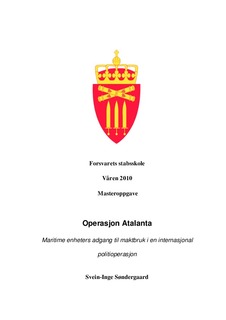Operasjon Atalanta: Maritime enheters adgang til maktmisbruk i en internasjonal politioperasjon
| dc.contributor.author | Søndergaard, Svein-Inge | |
| dc.date.accessioned | 2010-12-22T12:25:19Z | |
| dc.date.available | 2010-12-22T12:25:19Z | |
| dc.date.issued | 2010 | |
| dc.identifier.uri | http://hdl.handle.net/11250/99916 | |
| dc.description.abstract | Operation Atalanta – Legal use of force in an international maritime policing operation. The upsurge of pirate attacks off the coast of Somalia has been a cause for concern both for the United Nations and the European Union. As a response to the pirate menace the European Union launched Operation Atalanta, its first maritime operation ever. This paper analyses the legal framework for the operation, with emphasis on the legal constraints on the use of lethal force. The operation supports the implementation of several United Nations Security Council Resolutions. These also give the mandate that allows for the use of all necessary means. This phrase normally opens for the use of force beyond self defence. The analysis indicates that Operation Atalanta is basically a police operation and that the European naval force has to abide by the Convention for the Protection of Human Rights and Fundamental Freedoms. Article 2 of the Convention secures the right to life and prohibits the intentional use of lethal force. The analysis concludes that the legal constraints on the use of force in the worst case could prevent or at least delay the success of Operation Atalanta. | en_US |
| dc.language.iso | nob | en_US |
| dc.subject | Piratbekjempelse | en_US |
| dc.subject | Politioperasjoner | en_US |
| dc.subject | Maritime operasjoner | en_US |
| dc.title | Operasjon Atalanta: Maritime enheters adgang til maktmisbruk i en internasjonal politioperasjon | en_US |
| dc.type | Master thesis | en_US |
| dc.source.pagenumber | 74 s. | en_US |
Tilhørende fil(er)
Denne innførselen finnes i følgende samling(er)
-
Masteroppgaver [466]
